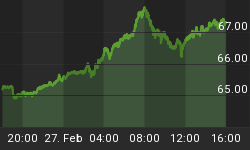The "whatever it takes" economy is progressing nicely around the world, with governments and central banks doing things that no 20th century economist would have viewed as possible, let alone wise.
Now the question becomes, where does this process hit the wall first? Based on recent events, Europe is looking like the best bet. Consider the European Central Bank's use of taxpayer money to buy not just junk bonds, but Italian junk bonds:
Draghi Buying Junk Bonds Shows ECB Will Do Whatever It Takes
(Bloomberg) – Since a surprise interest-rate cut at his first meeting as European Central Bank President, Mario Draghi has shown a penchant for pushing the envelope.
The bank's entry into the corporate bond market on Wednesday was no exception: buying bonds with junk ratings. The second day didn't disappoint either, with purchases of notes from troubled German carmaker Volkswagen AG.
By casting his net as wide as the program allows, Draghi ensured that the first day of corporate bond purchases made an impact. While the ECB has said it would buy bonds from companies with a single investment-grade rating, investors expected the central bank to start with the region's highest-rated securities.
"It's been an aggressive start to the program," said Jeroen van den Broek, ING Groep NV's Amsterdam-based head of debt strategy and research. "The wide-reaching nature of the purchases shows Draghi means business."
Purchases on the first day included notes from Telecom Italia SpA, according to people familiar with the matter, who aren't authorized to speak about it and asked not to be identified. Italy's biggest phone company has speculative-grade ratings at both Moody's Investors Service and S&P Global Ratings. The company's bonds only qualify for the central bank's purchase program because Fitch Ratings ranks it at investment grade.
Moody's and S&P have ranked Telecom Italia one level below investment grade, at Ba1 and an equivalent BB+ respectively, since 2013.
"This dispels any doubts investors may have had about the commitment of the ECB and the central banks to tackle lower-rated names," said Alex Eventon, a Paris-based fund manager at Oddo Meriten Asset Management which oversees 46 billion euros ($52 billion). "Telecom Italia is firmly at the weak end of the spectrum the ECB can buy."
Investors can be reassured that the ECB won't immediately dump the bonds if the ratings fall below the criteria for purchase. The central bank said last week securities can be retained even if they lose all their investment-grade ratings.
Investors have snapped up corporate bonds on the promise of central bank purchases, driving up prices and cutting borrowing costs. The average yield for investment-grade euro notes tumbled to 0.98 percent on Wednesday, the lowest in more than a year, according to Bank of America Merrill Lynch index data. Junk bonds have also rallied, with the average yield falling to a one-year low at 4.61 percent, the index data show.
While the ECB is subsidizing badly-run companies, the peripheral eurozone countries that can't function in a strong currency regime are lobbying for a massive welfare program of their own:
France Leads Call for Spending in South to Remake EU Post-Brexit
(Bloomberg) – The fight is on for what shape the European Union will take in light of Brexit, with economies great and small jockeying for a say. After Germany's Angela Merkel made a diplomatic push to solicit ideas last month, the seven southern nations are trying to increase their leverage at next week's key summit in Bratislava that will chart a roadmap for the 27-nation alliance minus its second-biggest economy.
Their common demand is for a doubling of an investment plan that at the moment stands at 315 billion euros ($353 billion) over a space of three years and "more ambitious initiatives" for jobs for young people.
In an allusion to the EU's tight budgetary corset, Renzi stressed that "we are in a phase in which Europe cannot keep being just rules, technicalities, finance and austerity."
Central banks buying even high-grade bonds was, not so long ago, seen as a risky and experimental departure from commonly understood practice, something to do temporarily in an emergency. But a central bank buying junk bonds (and equities, as the Japanese and Swiss banks have been doing) is something altogether different because it changes the nature of the marketplace. In a functioning capitalist system, badly-run companies aren't just expected to fail, they must fail in order to show everyone else what not to do. But give the worst-run firms effectively-unlimited funds and they'll continue to limp along, expanding their dysfunctional business models and generally making it impossible for their competitors to know what does and does not work. The result: even more misallocated capital and -- soon -- an epic bust.
It's not as obvious why the second development – the end of austerity and beginning of a massive transfer of wealth from Germany to Greece, Italy, et al – is such a bad idea. It might not have been a decade or two ago. But today most European governments carry record levels of debt and the ECB's balance sheet is multiples of what it was at the dawn of the euro.

Ramping up borrowing and spending now is just adding to an already crushing burden, guaranteeing that interest rates can never be normalized (because everyone's debt would have to be rolled over at higher rates, causing interest costs to skyrocket). Here again, the credit market's price signaling mechanism is paralyzed, with eventually-catastrophic results.
Last weeks' bond market turmoil may or may not be a sign that we've hit the inevitable wall. But that's what it will feel like when we do.
















